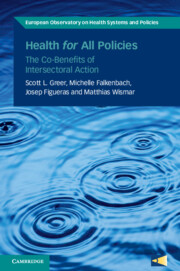Health for All Policies
Factors outside of healthcare services determine our health and this involves many different sectors. Health for All Policies changes the argument about inter-sectoral action, from one focusing on health and the health sector to one based on co-benefits – a ‘Health for All Policies’ approach. It uses the Sustainable Development Goals as the framework for identifying goals across sectors and summarizes evidence along two causal axes. One is the impact of improved health status on other SDGs, e.g. better educational and employment results. The other is the impact of health systems and policies on other sectors. The ‘Health for All Policies’ approach advocated in this book is thus a call to improve health to achieve goals beyond health and for the health sector itself to do better in understanding and directing its impact on the world beyond the healthcare it provides. This title is also available as Open Access on Cambridge Core.
Scott L. Greer is a political scientist and specialist in the comparative politics of health, with special interests in federalism, the European Union, health governance and social policy. His recent books include Everything you always wanted to know about European Union health policy but were afraid to ask (third edition, 2022); Ageing and Health: The Politics of Better Policies (2021); and Coronavirus Politics: The Comparative Politics and Policy of COVID-19 (2021).
Michelle Falkenbach is a technical officer at the European Observatory on Health Systems and Policies main office in Brussels and Adjunct Clinical Assistant Professor in the department of Health Management and Policies at the University of Michigan. Her main area of research is on the health and care workforce, focusing primarily on ways to increase retention and recruitment efforts for this sector. Prior to joining the Observatory, Dr. Falkenbach was a post-doctoral research at Cornell University focusing on the impact of populist radical right parties on health and health systems.
Josep Figueras is the Director and cofounder of the European Observatory on Health Systems and Policies. In addition to WHO, he has served major multilateral agencies such as the European Commission or the World Bank and has worked as policy advisor in more than forty countries. He was Co-chair of the Scientific Advisory Board of the Monti Commission, and member of several governing, advisory and editorial boards including the governance board of the European Health Forum Gastein.
Matthias Wismar is Programme Manager at the Observatory based in Brussels. His work focuses on health policy, politics and governance, the health workforce, European integration and intersectoral action and the Sustainable Development Goals. He is developing studies, policy briefs, rapid responses and face-to-face dissemination and knowledge brokering formats.



